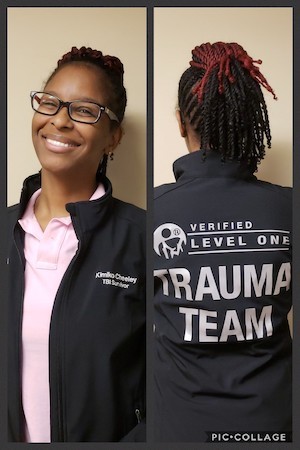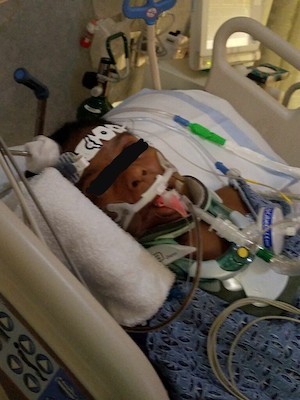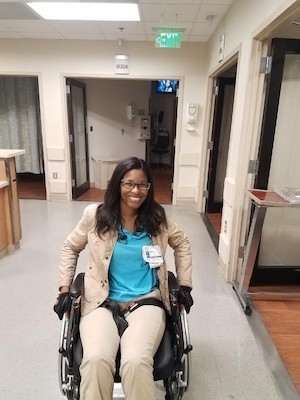Kimiko's Story
 I do not remember the day of my accident, but the stories are scary. My husband told me that we were making our normal Christmas rounds, and we stopped by my mom’s house. She asked if we could help move a tire. When we saw how massive the tractor tire was, we immediately said no, but she was adamant, and so we attempted to help. I was told we stopped for some time because of exhaustion. At that time, we told her that we could not move the tire and she would have to wait until someone else could help. She called my younger brothers (age 8 and 6) to come. My husband and I both knew the tire was too heavy for them, so we proceeded to move the tire again. Shortly after, I lost my footing and the tire fell on both of us. Luckily, my husband managed to wiggle his way from under the tire, however, more of this tire enveloped my body so unfortunately, I was not able to do the same. My husband stayed with me to try to keep me calm while my mom went to get something to help pry me from under the tire. I was told the last thing I said to my husband was I love you, before passing out. The ambulance arrived but the crew was unable to get the tire off me, so they
I do not remember the day of my accident, but the stories are scary. My husband told me that we were making our normal Christmas rounds, and we stopped by my mom’s house. She asked if we could help move a tire. When we saw how massive the tractor tire was, we immediately said no, but she was adamant, and so we attempted to help. I was told we stopped for some time because of exhaustion. At that time, we told her that we could not move the tire and she would have to wait until someone else could help. She called my younger brothers (age 8 and 6) to come. My husband and I both knew the tire was too heavy for them, so we proceeded to move the tire again. Shortly after, I lost my footing and the tire fell on both of us. Luckily, my husband managed to wiggle his way from under the tire, however, more of this tire enveloped my body so unfortunately, I was not able to do the same. My husband stayed with me to try to keep me calm while my mom went to get something to help pry me from under the tire. I was told the last thing I said to my husband was I love you, before passing out. The ambulance arrived but the crew was unable to get the tire off me, so they  called the fire department. It took 6 men to free me from the tire. I was down for an unknown amount of time. EMS started CPR with a return of spontaneous circulation after one round of compressions. I was intubated on the scene and transported to the Medical Center, Navicent Health with a Glasgow Coma Scale score of a 3T. I had a severe anoxic brain injury, due to my out of hospital cardiac arrest. Upon arrival, there was a collaboration between specialists, mainly the trauma team and the medical director for the adult Palliative Care service (of the department I work for) to start the normothermia protocol, also known as therapeutic temperature management. My body was only lowered to 36 degrees Celsius due to my shivering versus having seizures. I was posturing and having sympathetic storming. I was transferred to the ICU, where I was in a coma for eight days. I was told that when I woke up, I would constantly repeat things and my short-term memory was seemingly non-existence. I could not hold my arm up against gravity.
called the fire department. It took 6 men to free me from the tire. I was down for an unknown amount of time. EMS started CPR with a return of spontaneous circulation after one round of compressions. I was intubated on the scene and transported to the Medical Center, Navicent Health with a Glasgow Coma Scale score of a 3T. I had a severe anoxic brain injury, due to my out of hospital cardiac arrest. Upon arrival, there was a collaboration between specialists, mainly the trauma team and the medical director for the adult Palliative Care service (of the department I work for) to start the normothermia protocol, also known as therapeutic temperature management. My body was only lowered to 36 degrees Celsius due to my shivering versus having seizures. I was posturing and having sympathetic storming. I was transferred to the ICU, where I was in a coma for eight days. I was told that when I woke up, I would constantly repeat things and my short-term memory was seemingly non-existence. I could not hold my arm up against gravity.
What was recovery like?
I was transferred from Medical Center, Navicent Health to the Shepherd’s Center on January 9, 2018. While at the Shepherd’s Center, I worked diligently with physical therapy, speech  therapy, occupational therapy and a psychiatrist. I was discharged on February 1, 2018. I was sent home to start outpatient physical therapy at Rehabilitation Hospital, Navicent Health. I was able to ambulate with a walker for short distances but used a wheelchair for longer distances. I had progressed to a rollator by the end of therapy. I am still working on my confidence with walking independently along with my fear of falling. My feet seem to be hypersensitive to texture thus I had to find the perfect pair of tennis shoes to function. I still have my good and bad days but overall, I am just elated to be alive.
therapy, occupational therapy and a psychiatrist. I was discharged on February 1, 2018. I was sent home to start outpatient physical therapy at Rehabilitation Hospital, Navicent Health. I was able to ambulate with a walker for short distances but used a wheelchair for longer distances. I had progressed to a rollator by the end of therapy. I am still working on my confidence with walking independently along with my fear of falling. My feet seem to be hypersensitive to texture thus I had to find the perfect pair of tennis shoes to function. I still have my good and bad days but overall, I am just elated to be alive.
Why did you want to get involved with the TSN program? Or Why do you want to share your story with other survivors/loved ones?
I returned to work April 30, 2018 with a new perspective and outlook on life. I was once a caregiver, then became a therapist (which I should be fully licensed in a month or two), and now I have been a patient. I say that my experience has brought me full circle in my career. I can join, build rapport and truly empathize with both the patients and families. There were some adjustments that needed to be made for me when I returned to work because of my inability to ambulate well. I had to figure out different routes throughout the hospital since I was in a wheelchair. The facilities maintenance department adjusted doors near my work area so that I was able to get through them safely. I also met with the trauma services. They shared with me that they want to become a part of the Trauma Survivors Network and would like me to be the coordinator. I thought this was awesome given my expertise as a therapist, having first-hand experience as being a trauma patient and since trauma was my new passion. I seized the opportunity since I wanted to do something to give back to our patients and families and provide a safe space for the families and patients to voice their fears and concerns. Thus, being the coordinator provides me with his opportunity.